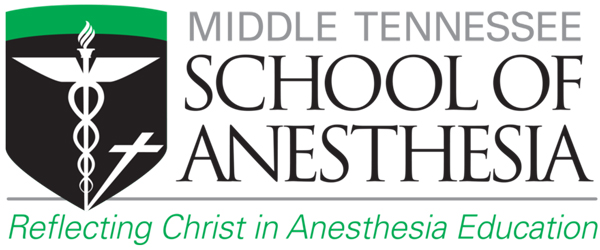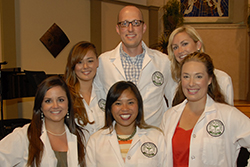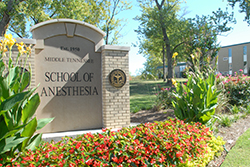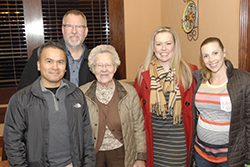Airways
July – September 2021
MTSA Celebrates 7th Annual Mission & Awards Gala
Middle Tennessee School of Anesthesia hosted the 7th annual Mission & Awards Gala, presented by Anesthesia Medical Group, on May 6 at the Westin Nashville, celebrating the many accomplishments of the anesthesia community while advancing the School’s Mission Initiatives.
Above photo: MTSA Gala award recipients (l to r) Amanda Dickert, Les Andrus, Alescia DeVasher Bethea and Rhonda Tucker.
Fox 17 Special Projects Reporter Dennis Ferrier served as master of ceremonies for the evening, which included an online silent auction, dinner and award ceremony. MTSA Class of 2021 student Alexandria Johnson gave the invocation.
Kicking off the event, MTSA President Chris Hulin provided an update on international mission activities, saying that the School’s engagement with Haiti is temporarily on hold due to civil unrest. Efforts in Guatemala were paused due to the pandemic. And the work in Guyana continues on a limited basis as the partner institution is in the process of converting to a degree program.
Reflecting on the importance of MTSA’s mission work, Hulin encouraged attendees to “keep this momentum as we continue to raise funds, gather, celebrate and uplift our profession and our colleagues. All these funds—every penny raised—goes 100% to support mission activities locally and internationally.”
Prior to the main award ceremony, special recognition was given to Jim Closser, CFRE, Vice President, Alumni & Advancement, for his upcoming retirement, with Ferrier noting that Closser has been “an absolute champion of this School, its mission and service in the Lord—tireless and enthusiastic and such a gentleman.” Those in attendance gave a standing ovation in honor of his many years of service to MTSA.
During the award presentations, the School recognized the following individuals for their unique achievements:
Mary Elizabeth “Ikey” DeVasher Alumni Distinguished Service Award: Alescia DeVasher Bethea, PhD, CRNA
Mission & Heritage Award: Les Andrus, MS, CRNA
Clinical Excellence Award: Rhonda Tucker, MS, CRNA
Nevin Downs, MD Leadership Award: Amanda Dickert, DNAP, CRNA
The event committee included: Matthew Demaree, MSN, MS, CRNA, Chairman; Alison Martin, DNAP, Chairman Elect; subcommittee chairs Rhonda Hendon, Buffy Lupear, Meg McDonald, Gale Rowe and Lyndsey Steen; and committee members Michelle Arant, Jordan Miller and Michelle Sellers.
Event sponsors included:
Presenting Sponsor: Anesthesia Medical Group, PC
Sound and Stage Sponsor: Salameh Plastic Surgery & Skin Care
Distinguished Service Alumni Award: Valley Anesthesia Educational Programs
Mission & Heritage Award: Kentucky-Tennessee Conference of Seventh-day Adventists
Nevin Downs, MD Leadership Award: Myrtianne Downs
Clinical Excellence Award: Cardiovascular Anesthesiologists, PC
Patron Sponsor: INSBank – TMA Medical Banking
ABOUT THE GALA AWARDEES
Alescia DeVasher Bethea, PhD, CRNA
Mary Elizabeth “Ikey” DeVasher Alumni Distinguished Service Award
Alescia DeVasher Bethea, PhD, CRNA, is a native of Madison, Tennessee. Throughout her childhood, she attended MTSA events with her parents, Bernard and Mary Elizabeth “Ikey” DeVasher. She earned her Associate of Science in Nursing and Bachelor of Science in Nursing at Southern College of Seventh-day Adventists, then joined the Critical Care Unit at Nashville Memorial Hospital in Madison, Tennessee in 1992 and completed her master’s degree at MTSA in 1995. She started working as a Graduate Registered Nurse Anesthetist at Tennessee Christian Medical Center (TCMC) in Madison and Portland, Tennessee.
In 1996, Bethea began working at the Nashville VA Medical Center as a staff CRNA and teaching part-time at MTSA. She was among the initial small group of MTSA faculty to utilize the first Laerdal SimMan human patient simulator, integrating high-fidelity simulation within the courses she taught and helping to launch MTSA’s first Simulation Skills Lab. In 2005, Bethea became MTSA’s Associate Vice President for Institutional Effectiveness, helping the School achieve the maximal 10-year COA and SACSCOC reaccreditation. Her work also led to MTSA’s expansion from the master’s to the doctorate program. During that time, she completed her PhD in Education from Capella University. She is now serving as the Department Chair and Program Administrator for the Nurse Anesthesia Department at AdventHealth University (AHU) in Orlando, Florida.
“I felt surprised, humbled, and emotional when I was told that I was receiving this award,” Bethea said. “I remember hearing Mr. Bowen and ‘Aunt Dolly’ tell stories about their adventures providing anesthesia and anesthesia education at Madison and around the world. I’m familiar with my parents’ stories about their own anesthesia education and their CRNA careers, including the steps my mother took to lead MTSA from a certificate to a master’s degree and to the DNAP degree. It’s incredibly rewarding to have the privilege to continue the legacies of such amazing CRNA educational leaders as Mr. Bowen and my mother, by working in two Christian, mission-focused institutions to help students achieve their dreams of becoming CRNAs. To be presented with an award named after my mother is an amazing honor. I pray that God will guide me to help me ultimately live up to the high standards that she has personified.”
Since 1996, Bethea has been directly involved with providing nurse anesthesia education to approximately 1,188 SRNAs.
The Mary Elizabeth DeVasher Distinguished Alumni Service Award is awarded to a MTSA alumnus in honor of this MTSA alumnus and former Dean/Vice President/Program Administrator to celebrate and honor her 45 years of dedicated work and distinguished service to the institution.
Leslie M. Andrus, MS, CRNA
Mission & Heritage Award
Les Andrus, MS, CRNA, is a partner with Greeneville Anesthesia Services in Greeneville, Tennessee, serving Greeneville Community Hospital East and has been with them since 2014. Prior to that, he worked for Anesthesia Services Associates primarily at Skyline Medical Center in Madison, Tenn., as a staff CRNA starting in 2003.
Andrus earned a Bachelor of Science degree in nursing from Loma Linda University in his home state of California. Prior to that he earned a Bachelor of Science degree in mechanical engineering with a math minor. His first nursing job was on the trauma ICU at Loma Linda University Medical Center. From there, he attended MTSA and graduated with his master’s degree in 2003. He has periodically attended MTSA’s CEU courses and several regional ultrasound anesthesia workshops.
During his time at Skyline Medical Center, Andrus worked as a clinical site coordinator for MTSA. He also has served on MTSA’s Alumni and Gala committees, helping to expand MTSA’s visibility, reputation and outreach into the community and to form a more proactive focus on giving opportunities from alumni and other community members for the School’s future plans and mission efforts, both locally and abroad.
“I’m honored to receive this award, and I’m very thankful to MTSA,” Andrus said. “The school enabled me to take this path to become a nurse anesthetist. I’ve tried to help CRNAs become the best at what they do, instilling those values that reflect well on themselves, our profession and our School. I also wanted to help MTSA have a bigger impact on our community, especially since it is a Christian institution with a mission that aims to serve others. I believe our work is a ministry of healing, modeled by Christ. We’re helping people in their most vulnerable times, both during surgery and in broader ways outside the OR.”
Andrus met his wife, Anne in high school and they have been married for 22 years. They have one daughter, Lillybeth. His interests include playing trumpet, photography, water skiing, entertaining at home and travel. He enjoys contributing time and resources toward his church and his daughter’s school and various other mission oriented organizations.
The Mission & Heritage Award is awarded to an individual who embodies and exemplifies the heritage, mission and core values of MTSA.
Rhonda Tucker, MS, CRNA
Clinical Excellence Award
Rhonda Tucker, MS, CRNA, began her anesthesia career working for Anesthesia Medical Group, doing a combination of obstetrics, pediatrics and general adult anesthetics. In 2001 she was able to follow her heart and began doing pediatric anesthesia at Monroe Carell Jr. Children’s Hospital at Vanderbilt and has been there ever since. She has the privilege of working with and teaching nurse anesthesia students, residents, fellows and paramedics.
Tucker earned her bachelor’s degree in nursing from Austin Peay State University and her master’s degree from MTSA.
“Anesthesia school was a very busy and stressful period with school and three small children. My CRNA husband provided me with the support and encouragement I needed to make it through school. I use the memories of that time as a constant reminder when working with students to pay it forward,” Tucker said. “When I am working with a student, I use the opportunity to not only teach, but to hopefully make their day worthwhile and a little less stressful. I also learn from my students and feel honored to be a part of their journey.”
Tucker is married and has three children and eight grandchildren. She enjoys skiing, biking, hiking, riding her horses, and managing her horse boarding stable.
The Clinical Excellence Award is awarded to an anesthesia provider (anesthesiologist or CRNA) or clinical site (hospital, clinic, etc.) that provides a nurturing and exemplary atmosphere with true eagerness to instruct, train and educate MTSA students. The recipient will embrace the MTSA mission and core values.
Amanda Dickert, DNAP, CRNA
Nevin Downs, MD Leadership Award
Amanda Dickert, DNAP, CRNA, joined Vanderbilt University Medical Center (VUMC) in 2001 as a Care Partner in the Trauma Intensive Care Unit (TICU). She earned her Bachelor of Science in Nursing degree from Western Kentucky University in 2002 and transitioned to a registered nurse role in the TICU. She received her Master of Science degree with a focus in Anesthesia from MTSA in 2008. She then returned to VUMC as a Certified Registered Nurse Anesthetist. In 2020, Dickert received her Doctorate of Nurse Anesthesia Practice from MTSA, in which the focus of her capstone project was Automated Medication Dispensing for Anesthesia.
During her tenure with VUMC, Dickert has served in various leadership roles. Previously, she served as the Lead CRNA for the Pediatric Division at Vanderbilt’s Monroe Carell Jr. Children’s Hospital. Currently, Dickert is the Associate Chief CRNA for the more than 200 VUMC CRNAs. Her role also includes oversight of the VUMC CRNA Specialty Staffing Network, a team of CRNAs who provide 24-hour cross coverage for VUMC’s pediatric, obstetrics and adult surgical cases. Dickert continues to practice clinically within the VUMC system, in both the Adult and Pediatric Enterprises as well as various Ambulatory facilities.
“This past year has not been an easy year to be in leadership, so it is truly an honor to be the recipient of this year’s Nevin Downs Leadership Award. I am humbled to be held in the company of Dr. Downs and other past recipients of this award,” Dickert said. “I have always considered leadership a team sport, and that conviction has only strengthened as we have navigated the COVID-19 pandemic. The Vanderbilt anesthesia leadership team truly came together in support of our patients, our community and each other. I will forever consider that leadership team and this award amongst the silver linings of such a challenging time.”
Dickert enjoys travel, and lives in Franklin, Tennessee., with her husband Shaun and daughter Avery (8).
The Nevin Downs Leadership Award is awarded to an anesthesia provider (anesthesiologist or CRNA) who personifies the integrity, honesty, fairness and exemplary leadership with which Dr. Downs served the profession including his advocacy of nurse anesthesia and MTSA.
President’s Message: Advocating for CRNAs
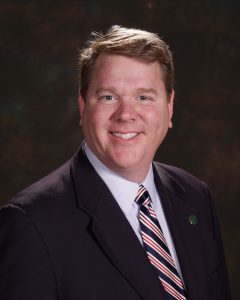
Chris Hulin
DNP, MBA, CRNA
President
I’ve always believed MTSA’s role in equipping nurse anesthetists for a rewarding career goes beyond the classroom and clinical setting. It requires a seat at the table when lawmakers or health system leaders set healthcare policy, whether it be at the national, state or local levels. To that end, I’m honored to be a part of the AANA’s Reimbursement Task Force, which was chartered to address business and legislative practices that effect CRNA scope of practice and payment. The AANA board recognizes that specific business and policy education was not a part of many nurse anesthesia schools’ curriculum prior to the implementation of the doctoral education standards. To address this issue, former AANA President Larry Hornsby and I have been asked to lead a team to assist the AANA in developing education material to better prepare the CRNA workforce to advocate and demonstrate additional value in the field of anesthesia.
As the COVID-19 pandemic raged during the past year, CRNAs had the opportunity to demonstrate our value in and out of the operating room. At the same time, America’s other epidemic, opioid addiction, continued and, in some communities, expanded. This is also an area where CRNAs continue to serve on the frontlines by offering alternatives to “opioid-only” treatment of surgical pain. To support this issue, the AANA stepped up its efforts to expand the use of non-opioid pain management treatments by supporting the Non-Opioids Prevent Addiction in the Nation (NOPAIN) Act in Congress. Meanwhile, MTSA continues to advance scholarship and leadership in this area through the Acute Surgical Pain Management (ASPM) Fellowship, and as you can read in this issue, MTSA is now beginning to explore transitional pain management with hopes of continuing to make contributions as this field of practice expands.
Another area that MTSA has identified a need within the CRNA community is the lack of qualified and prepared CRNA faculty members. Many schools discover that it is not difficult to find a CRNA who will teach, but far more difficult to find a “teacher” that is a CRNA. In order to address this issue, MTSA has developed an educational track that can be combined with the DNAP completion degree. After finishing this program the graduate will be qualified to take the Certified Nurse Educator exam. If combined with the ASPM Fellowship, the graduate will become an immediate asset to any CRNA program, and highly marketable. In addition, qualified applicants can receive an 85% tuition discount if they agree to be involved in CRNA education for four years after graduation.
While MTSA has been expanding our influence in the areas above, it is also important to note that our DNAP entry to practice program continues to develop and grow stronger. In June, invitations for the class of 2024 were sent out. There was initial concern about the applicant pool following COVID-19 and the effect it had on higher education. However, I am pleased to report that our applicant pool, and subsequent selected cohort, is the normal “MTSA strong,” and in the categories of experience and GPA, the averages actually went up. Program Administrator Dr. Rusty Gentry has also added a full-time CRNA faculty member to his team, Dr. Garrett Salmon. Dr. Salmon joins us from Middle Tennessee State University, where he has been educating entry to practice RNs and nurse practitioners.
I am proud to report on the above activities here at the School and humbled to be a part of it. God has blessed and continues to bless this institution and those who have been a part of it. I am grateful to the staff and faculty that have brought MTSA to where it is today. I am also energized as I consider the School’s future and the collective impact each of us can make on this outstanding profession.
MTSA Service in Action

MTSA staff (l to r: Jon Ronning, Jim Dukes, Jean Baron-White, Jennifer Speer, Caroline Bizot, Asia Byers, Jim Closser and Sara Metcalf) enjoyed a service opportunity on May 26 at the King’s Daughters Day Home & Child Development Center located in Madison, Tenn. Weeding, mulching, planting and playground clean up were the tasks accomplished by the group.
MTSA provides release time for its employees to serve in three different volunteer activities annually. King’s Daughters has been serving members of the community for more than 50 years, providing child care and educational programs for children from financially challenged families.
Student Day

MTSA Class of 2023 students, faculty and staff gathered for Student Day on May 3. The event provided a special opportunity for students to come together as a group for the first time and learn from a variety of presenters about graduate school life and school policies. In addition, attendees enjoyed a delicious BBQ meal, corn hole games, and making their own MTSA-branded T-shirt.
Regional Cadaveric Workshop
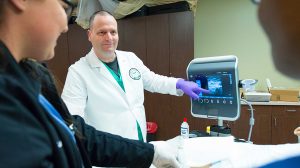 Participants in MTSA’s Cadaveric Ultrasound-Guided Regional Anesthesia workshops receive the benefits of small-group “live” scanning and needling stations, low faculty-to-attendee ratios, and an individualized learning plan that suits the attendee’s needs in regional anesthesia, according to Bill Johnson, DNAP, CRNA, Director of the MTSA Acute Surgical Pain Management Fellowship and DNAP Completion program. Information presented is highly practical and immediately useful to the attendee’s daily clinical practice.
Participants in MTSA’s Cadaveric Ultrasound-Guided Regional Anesthesia workshops receive the benefits of small-group “live” scanning and needling stations, low faculty-to-attendee ratios, and an individualized learning plan that suits the attendee’s needs in regional anesthesia, according to Bill Johnson, DNAP, CRNA, Director of the MTSA Acute Surgical Pain Management Fellowship and DNAP Completion program. Information presented is highly practical and immediately useful to the attendee’s daily clinical practice.
Limited capacity is available for the following Regional Cadaveric Workshops:
Advanced Course — July 25 *SOLD OUT*
Advanced Course — Oct. 17
Johnson said that the following blocks will be taught and demonstrated: PECs I/II, erector spinae, infraclavicular, serratus anterior, costoclavicular, RAPTIR, quadratus lumborum, TAP (iliohypogastric/ilioinguinal, transversalis, and posterior TAP), suprascapular (anterior and posterior approaches), and paravertebral nerve blocks. Advanced approaches to upper and lower extremity will also be taught, to include axillary at the circumflex artery, distal upper/lower USGRA blocks, and anterior sciatic.
Instructors for the daylong workshop include Johnson; Stace Dollar, MS, CRNA; John M. Edwards, III, MS, CRNA; Kelly Martin, MS, CRNA; and MTSA Acute Surgical Pain Management Fellows.
Participants can earn up to 16 Class A CE credits by completing the pre-course content and the course content combined. In addition, the AANA designates this program as meeting the criteria for up to 2 CE Credits in pharmacology/therapeutics.
Registration is available at www.mtsa.edu/workshops. For more information contact Bill Johnson at (615) 732-7846, bill.johnson@mtsa.edu.
Acute Surgical Pain Management Fellowship expands clinical sites, curriculum
Participants in MTSA’s Acute Surgical Pain Management (ASPM) Fellowship will soon have access to a new state-of-the-art clinical site in Mt. Shasta, Calif., focused on transitional pain services, according to Bill Johnson, CRNA, DNAP, Director, ASPM Fellowship and Doctorate Completion Program.
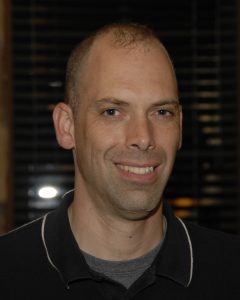 MTSA graduate Jon Wilton (right) is director of anesthesia and chronic pain at Mercy Medical Center Mt. Shasta. His practice focuses on opioid-free interventions for chronic pain management. Wilton has joined MTSA in a special role as a clinical mentor and will help develop curriculum based on the growing area known as “transitional pain,” which includes a wide variety of preoperative interventions to minimize pain while a patient awaits surgery. It also includes caring for patients who transition to chronic pain.
MTSA graduate Jon Wilton (right) is director of anesthesia and chronic pain at Mercy Medical Center Mt. Shasta. His practice focuses on opioid-free interventions for chronic pain management. Wilton has joined MTSA in a special role as a clinical mentor and will help develop curriculum based on the growing area known as “transitional pain,” which includes a wide variety of preoperative interventions to minimize pain while a patient awaits surgery. It also includes caring for patients who transition to chronic pain.
“Jon operates one of the most cutting-edge anesthesia departments anywhere in the country,” Johnson said. “They’ve moved to a transitional pain service model where patients come in up to six weeks before their surgery, and they are able to provide long-acting regional blocks, which allow the patient to manage their pain without using narcotics. Then during surgery, they perform the conventional blocks that we teach in the Fellowship, followed by post-operative pain management.”
Johnson said that the Fellowship curriculum will begin to reflect the growing shift into transitional pain management, led by Wilton’s expertise. A few examples include preoperative cryoanalgesia for shoulders, knees, and intercostal nerves; pulsed or continuous radiofrequency neuromodulation for the shoulder, hip, and knees; and greater and third occipital nerve blocks and musculoskeletal injections, among other therapies.
“When we examine acute versus chronic pain, it’s really more of a continuum,” Wilton said. “There are plenty of patients, up to 85 percent depending on the procedure, who have surgery and end up with chronic pain. A transitional pain service helps remove the divide between chronic and acute. We’re identifying patients who are at risk before surgery and taking special precautions to make sure that their pain is treated adequately.”
According to Johnson, Wilton’s role as a clinical mentor for MTSA places him at the highest tier of knowledge and experience in nurse anesthesia, as evidenced by his use of innovative techniques and publishing original research articles. In addition, he has developed one of the largest online groups for ultrasound-guided regional anesthesia, with more than 6,000 global members sharing information and best practices.
“Because state regulations don’t allow the use of fluoroscopy, Jon employs an extremely innovative procedures for chronic pain management using ultrasound exclusively, which is practically unheard of. In addition, he has expanded the utilization of certain equipment which has pushed manufacturers such as Avanos and Iovera to recognize the application of their products in nurse anesthesia, adding CRNAs to their provider list. This includes both freezing and applying heat to nerves to prevent them from transmitting pain for a long period of time,” Johnson said.
According to Johnson, as the transitional pain curriculum is added to the Fellowship, the initial focus will be on long-term pain management for shoulder and knee patients, then expanded into other specialties.
“Jon’s involvement at MTSA will have huge benefits to our Fellows and, by extension, patient care in a variety of settings. It will boost the innovation and clinical experiences of our Fellows and provide exciting new opportunities for our profession,” Johnson added.
JOIN THE FELLOWSHIP
Now Enrolling
From medical management approaches, such as multimodal therapies and opioid sparing strategies, to advanced interventional techniques, including continuous catheter utilization, the ASPM Fellowship enables CRNAs to acquire the knowledge to treat patients with confidence and skill.
The Fellowship curriculum includes special focus on perioperative point-of-care ultrasound (PoCUS), which is the use of portable ultrasonography at a patient’s bedside for diagnostic and therapeutic purposes. Along with its use for pain management, heart, lung and abdominal ultrasound scanning may reveal sources of hypotension, hypoxemia and other presentations of cardiopulmonary instability.
In addition, fees for the basic and advanced Regional Cadaveric Workshops are waived during the Fellowship enrollment period for any applicants who have met all the admission requirements.
Application period closes Nov. 1. For more information about the ASPM Fellowship, visit www.mtsa.edu/fellowship.
Class of 2023 White Coat Ceremony
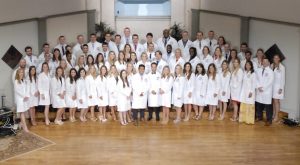
Thursday, Aug. 12
2:00 p.m.
Location: Madison Campus Seventh-day Adventist Church
MTSA recognizes first-year students’ successful completion of the second semester of the DNAP program including skills testing and machine check off. Students and family members are welcome as students receive their official MTSA lab coat.
Save the Dates for MTSA’s Fall Events

Golf Classic
Thursday, Sept. 16
The Golf Classic offers the chance to go for the green while supporting MTSA. Teams of four will compete in a scramble format. Prizes will be awarded. Lunch and dinner are provided during the event. Proceeds support MTSA’s Mission Initiatives, including efforts in Guyana and local communities.
Sporting Clay Tournament
Friday, Nov. 5
MTSA’s popular Sporting Clay Tournament allows marksmen and novices alike to hit moving targets at multiple shooting stations at the Nashville Gun Club. Lunch will be provided, and prizes are awarded for participants who hit the most clays. Proceeds support MTSA’s Opioid Reduction initiative.
For more information and registration, visit www.mtsa.edu/events.
Closser retires after 16 years at MTSA
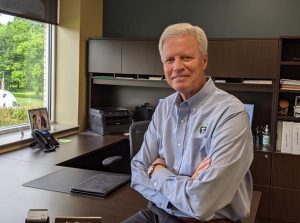
After serving MTSA as Vice President, Alumni & Advancement, for 16 years, Jim Closser, CFRE, retired at the end of June. Staff, colleagues, family and friends gathered for a special party, showing gratitude for the many ways he served the School.
Photo (right): Jim Closser celebrates his retirement with (l to r) his mother, Dorothy Musselwhite, his wife, Myrna, and their son, Jimmy.
“Anyone who knows Jim knows of his immense dedication to MTSA and his deep love of the Lord,” said MTSA President Chris Hulin. “He has faithfully served this institution and helped keep us focused on our mission to reflect Christ in anesthesia education. His hard work over the years helped keep the School at the forefront of the profession and maintain a high level of engagement with our alumni and supporters.”
Prior to his role at MTSA, Closser served as Executive Director for the Tennessee Christian Medical Center Foundation and Director of Development/Community Relations for Tennessee Christian Medical Center. He was with the organization for 25 years. Before moving to Nashville, he was employed by AdventHealth/Orlando as a public relations intern.
Reflecting on MTSA’s history at his final staff devotional, Closser reminded colleagues that founders E.A. Sutherland, E.G. White and Percy T. Magan arrived in Madison on the Morning Star riverboat. “Here we are today, carrying on a legacy that began 117 years ago by a group of committed, mission-minded folks, who navigated the river system on a riverboat named the ‘Morning Star,’” he said, pointing out that Jesus referred to Himself as the “Bright and Morning Star.” Closser added that he wants to continue challenging himself and others to find the comfort and “Light” that overcomes the darkness found in the world today and to be ready when Jesus comes.
When asked about his retirement, Closser said, “I’ve been incredibly blessed to have been a part of MTSA these past 16 years. It’s been fun to work alongside a great team of colleagues and our wonderful alumni community – both to witness and be a part of the growth and development of the School. It’s bittersweet to leave, but I have made lifelong friends and relationships that I’ll cherish forever.”
“On behalf of the entire faculty and staff, I wish Jim and Myrna all the best on this new chapter in their lives. I’m certain they will continue to work for God’s Kingdom and bear much fruit in all they do,” Hulin added.
Closser continues in a volunteer capacity as President of the Tennessee Christian Medical Foundation, which funds Nashville area non-profit organizations. He and his wife Myrna plan to enjoy traveling and music, and he will continue his love of photography.
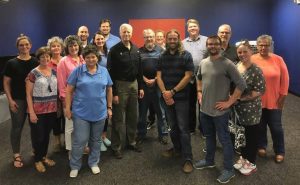
MTSA faculty publish study in 'Annals of Breast Surgery'
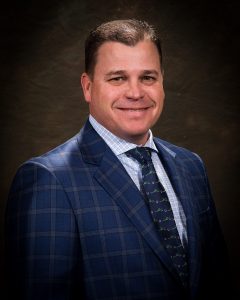
Stace Dollar, MS, CRNA
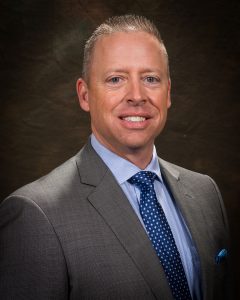
John Edwards, III, MS, CRNA
A research study on new recovery protocols co-authored by Stace Dollar, MS, CRNA, and John Edwards, III, MS, CRNA, was recently published in the Annals of Breast Surgery. Both serve as faculty for MTSA’s Acute Surgical Pain Management (ASPM) Fellowship and have been working toward advanced scholarship in nurse anesthesia.
Their study, Reduction in Opioid Consumption, Pain, and Anti-emetic Use: An Enhanced Recovery After Surgery Protocol for Breast Cancer Patients, tested an enhanced recovery after surgery protocol specifically designed to manage postoperative pain, nausea and vomiting among women undergoing mastectomy.
“We presented the preliminary data for this study at a couple different conferences, one in Dublin, Ireland, and the other in Dallas,” Edwards said. “Since then we developed the manuscript, submitted it and went through the review process. We’re grateful to have had the opportunity and see it get published in a peer-reviewed journal.”
Edwards was the corresponding author for the article. He said each of the authors played a different part in the research process. His role included working with the nursing research department in his facility, headed by Dorothy Brockopp, MSN, PhD, RN, FAAN; getting the writing team organized; managing the manuscripts; and bringing the project to completion with the reviewers.
“This research ties in perfectly with how we manage acute surgical pain. Being a part of the ASPM Fellowship helped make this process more manageable because we studied these cutting-edge techniques, and the Doctoral Completion program helped us learn how to prepare research for publication. So the education I’ve received at MTSA has really prepared me well for this type of work,” he added.
Edwards said he and Dollar look forward to working on future research studies. Some areas of interest include: exploring opioid disposal, drugs used to reduce bleeding during total joint replacement surgery, reducing axillary pain after shoulder surgery, and regional anesthesia techniques for a specific electrophysiology procedure.
Dollar and Edwards were recent recipients of the ASPM Fellowship “Outstanding Achievement Award,” presented at MTSA’s 2019 Commencement ceremony. Both are CRNAs at Baptist Health Lexington in Kentucky, where they co-founded and co-direct an Acute Pain Service. In addition, Edwards was the 2019 recipient of the Nevin Downs, MD Leadership Award. In 2018, Dollar received the Mary Elizabeth DeVasher Distinguished Alumni Service Award.
Walid Abou-Jaoude was the first author on the mastectomy study, with other co-authors Susan G. Yackzan, Stacy Stanifer, Martha Monroe, Barbara Self, Heather Shearin, and Thomas J. Young.
ABSTRACT
Background: Patients undergoing mastectomy, both with and without immediate reconstruction, frequently experience postoperative pain, nausea and vomiting. Enhanced recovery after surgery protocols have been designed in part to minimize these postoperative complications. The aim of this study was to test an enhanced recovery after surgery protocol specifically designed to effectively manage postoperative pain, nausea and vomiting among women undergoing mastectomy.
Methods: A retrospective cohort analysis was designed to examine the difference between patients who experienced traditional recovery after surgery (TRAS) and patients who experienced enhanced recovery after surgery regarding pain, opioid consumption, and antiemetic administration. The sample (N=204) included women undergoing mastectomy both with (n=102) and without (n=102) immediate reconstruction. No significant differences were found between these groups. Similarly, no significant differences were found related to the following sample characteristics; age, body mass index (BMI), opioid use, and pain scores on admission.
Results: Significant differences were found between groups related to pain on day of surgery (P<0.001), and postoperative day one (P<0.001). In addition, significant differences were found on both days (day of surgery P<0.001 and postoperative day one P<0.001) for opioid consumption and antiemetic administration (day of surgery P<0.009 and postoperative day one P<0.005). Mean, standard deviation, and frequency differences in the variables range from moderate to strong.
Conclusions: Results of this study among women with breast cancer undergoing mastectomy with and without reconstruction suggest that this enhanced recovery after surgery protocol can improve pain management, reduce opioid consumption, and diminish anti-emetic intake.
MTSA joins Sigma Theta Tau IOTA chapter
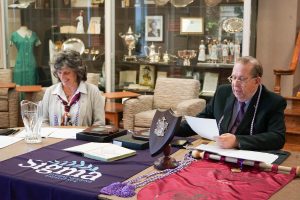
Sigma Theta Tau International Induction Ceremony
MTSA recently had its official induction ceremony to Sigma Theta Tau International Honor Society of Nursing, becoming an IOTA at-large chapter.
As part of the ceremony, MTSA Director, Center for Clinical Simulation, and Assistant Program Administrator, Clinical Affairs, Ginger Miller, DNP, CRNA, was inducted as a nurse leader; two members transferred or added membership to the School’s chapter (including Hallie Evans); and 14 new inductees gained membership: April Cook, Gail Crawford, Kristina de la Rosa, Katherine Gallagher, Rodaline Gerald, Taj Gubatanga, Jennifer Jorgensen, Tim Klassen, Tara Knabel, Jaclyn Luciano, Jenny McDonald, Nicole Siyem, Michelle Stotts and Alisa Vroman.
MTSA joined Vanderbilt School of Nursing to advance the IOTA Chapter of Sigma Theta Tau to an “at Large” chapter. According to MTSA Vice President of Academics and Institutional Effectiveness Maria Overstreet, PhD, RN, this union allows the School to offer its students an opportunity to participate in an honor society. Sigma’s mission is to help in “developing nurse leaders anywhere to improve healthcare everywhere.” Sigma now has more than 135,000 active members in over 100 countries.
MTSA focuses on the scholarship and service arms of Sigma that merge thoughtfully with the School’s mission of excellence in education and life of service, Overstreet said. Multiple scholarship funds exist for students, fellows and faculty to apply for assistance in their research endeavors. The local IOTA at large chapter participates with multiple local organizations to provide service for those in need.
Overstreet urged those interested in applying for new membership to contact her or Hallie Evans, DNP, CRNA, who teaches Evidence Based Practice in the DNAP Completion program. To transfer membership to the IOTA at large chapter, visit www.sigmanursing.org.
News Notes
MTSA welcomes new trustees
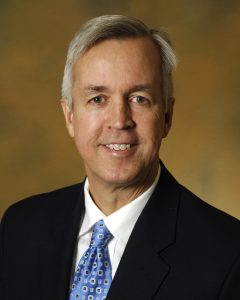
Kenneth Holroyd, MD, MBA, is Medical Director for the Center for Technology Transfer and Commercialization at Vanderbilt University and Vanderbilt University Medical Center, and also holds appointments as Associate Professor of Anesthesiology and Medicine. Joining Vanderbilt University in 2005, Ken is on the Board of Directors of Cumberland Emerging Technologies and The Human Vaccines Project, while previously serving on the Board of Directors of the Tennessee Technology Development Corporation, Informatics Corporation of America (ICA), Acuitec, digiChart, and Friends in Global Health. He is past Co-Chair of the Public-Private Partnership Committee of the National Institutes of Health’s Clinical and Translational Science Award (CTSA) Program. At Vanderbilt, his clinical practice of medicine is in Anesthesiology. Ken was in the biopharmaceutical industry for seven years, at Magainin Pharmaceuticals and Genaera Corporation, where he was Executive Vice President and Chief Operating Officer. Previously he was a faculty member at the University of Pennsylvania and at Johns Hopkins University, where his research interests included the genetics and molecular biology of asthma. Ken received his residency training in internal medicine and in anesthesiology at Johns Hopkins Hospital and University, and in pulmonary medicine at the National Institutes of Health. Johns Hopkins University awarded him the M.D. degree in 1984.
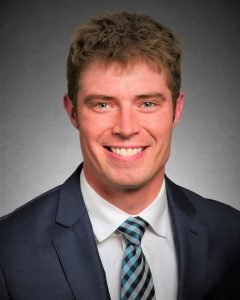
Nicholas Howald, is Chief Operating Officer at TriStar Skyline Medical Center. He came to TriStar Skyline from sister facility TriStar Hendersonville Medical Center in Hendersonville, where he served as COO for two years. He oversees operations at the 278-bed hospital and related care areas serving communities in and around Middle Tennessee and Southern Kentucky. Nick has seven years of increasing responsibility with HCA, starting as an administrative intern at TriStar StoneCrest Medical Center, then as an administrative resident and later as associate administrator at TriStar Centennial Medical Center. He also spent a period of time serving as the interim executive for the TriStar Transfer Center. Nick is originally from Iowa and earned his Bachelors of Arts, Masters in Health Administration and Policy, and Masters in Business Administration from the University of Iowa. In Hendersonville, he has served on the board of the Chamber of Commerce in Hendersonville and graduated from Leadership Sumner. Nick and his wife, Rachel, live in Hendersonville.
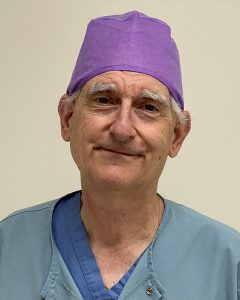
Paul Mazzoni, MD, is Managing Partner at Cardiovascular Anesthesiologists (CVA). Originally from New York City, he attended Tulane University for both undergrad and medical school. His anesthesiology residency and cardiac fellowship were done at Maine Medical Center in Portland. He began his career at Cardiovascular Anesthesiology PC at Saint Thomas Hospital in Nashville in 1984 and has been practicing there ever since. In his current practice he performs anesthesia for cardiac, neurosurgical and general cases about one third of the time each. He continues to keep a full clinical load and has been the managing partner of the group for the past 17 years, responsible for business operations.
1979 MTSA graduate retires
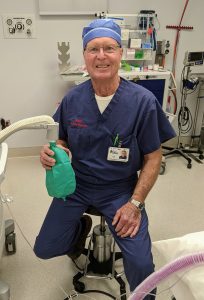 Rolf Jarnes graduated from MTSA in 1979 and retired July 1 after more than 40 years of providing anesthesia. All three of his children also attended MTSA. The following is a special commemoration from his daughter, Becky Jarnes:
Rolf Jarnes graduated from MTSA in 1979 and retired July 1 after more than 40 years of providing anesthesia. All three of his children also attended MTSA. The following is a special commemoration from his daughter, Becky Jarnes:
When talking to my dad, Rolf Jarnes, he remembers starting anesthesia with no pulse oximeters and no ETCO2. Anesthesia was very hands-on, checking mucus membranes for oxygenation and using manual blood pressure cuffs. Now, after adapting to an ever-changing medical world for 45 years, his practice of anesthesia is coming to a close as he retires July 1.
He started at MTSA during the years when enrollees were paid to go to school and work in the OR. He received a monthly stipend and was expected to have full responsibility of the patient when doing cases. My two brothers—Jesse and Ryan—and I (also MTSA graduates) have seen him as a pillar and inspiration for our own careers, and attended the same anesthesia meeting with him every year in Colorado so we could have mountain and anesthesia time together.
Dad started his career in East Tennessee and finished the final 14 years in Oregon at a critical access hospital in John Day. In the small cowboy town, everyone is part of the community, and there are so many stories we’ve heard from him about the cases passing through (airway cases from logging accidents, rodeo traumas, etc.) The story of a particular patient really sums up the empathy and passion he had throughout his career… There was a pediatric patient that needed to go to a bigger hospital three hours away. However, the EMTs didn’t feel comfortable taking care of the patient, so my dad rode the whole way in the back of the ambulance, keeping the patient stable until they reached the hospital. He then had to find a ride back again to John Day!
Dad has also had to put his skills to use on himself after he broke his hip mountain biking in Utah. Being helicoptered to the hospital, they couldn’t find IV access on him, so he of course started his own IV.
In retirement, he hopes to spend time with his grandchildren, ski as much as possible, and of course keep up to date on the new anesthesia techniques his children are experiencing in their own careers.
Wishing a Happy Retirement to Rolf Jarnes—well deserved!
From the Archives: Class of 2014
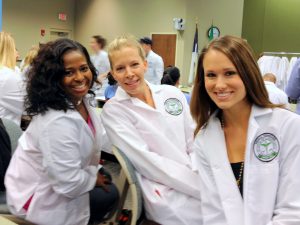
Members of the Class of 2014 (l to r) Ambra Jordan, Marie Jackson and Lindsey Hysmith celebrate at MTSA’s White Coat Ceremony in 2012.
The White Coat Ceremony for the Class of 2023 will be held Aug. 12 at the Madison Campus Seventh-day Adventist Church. Family and guests are welcome.


